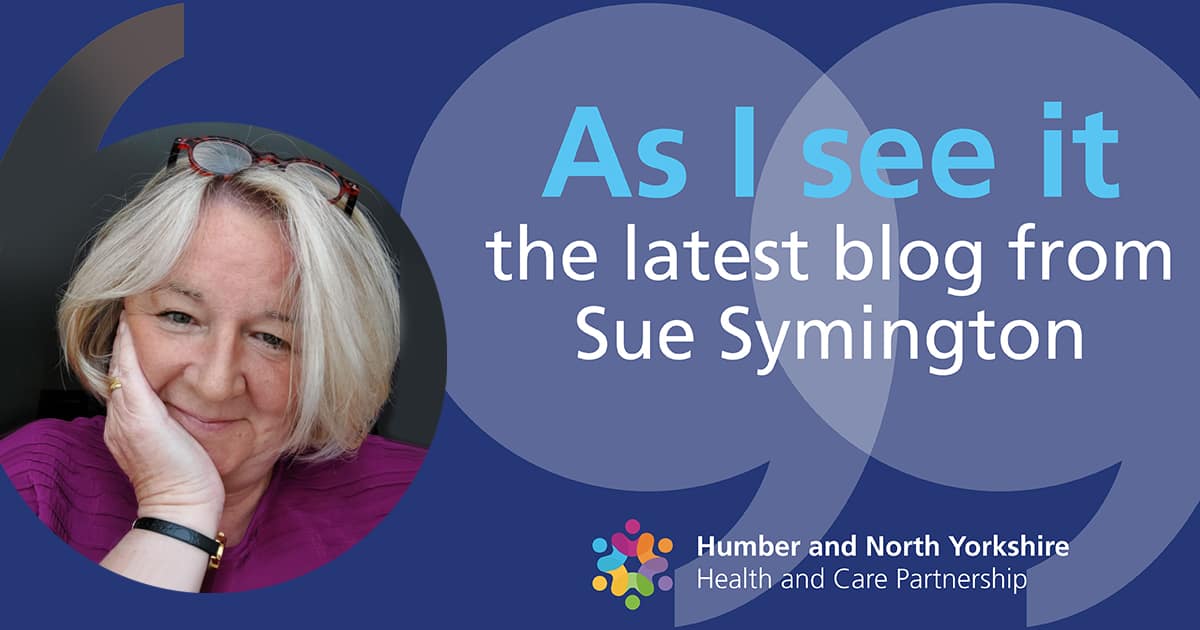As I see it – the latest blog from Sue Symington
Last month, I was pleased to attend one of our Patient Engagement Network meetings. I am always pleased to attend and support events which allow me to hear the thoughts and experiences of those we serve – our patients. As the Chair of our Integrated Care System, understanding both the positive and negative feedback about our services is crucial to the integrity of our work.
Our Integrated Care System operates in a complex landscape, balancing immediate needs with long-term strategic priorities. It is also one of the largest in England by geography, responsible for the health and care of 1.7 million individuals. Across Humber and North Yorkshire, we encounter stark health inequalities, reflecting the disparities prevalent among our communities.
Tacking these inequalities and improving the health of our population is what drives us. Our focus is to create the conditions which enable and empower our people, communities and organisations to achieve positive change.
In my role as Chair, I strive to see our work from different perspectives, the primary one being our patients. I cannot overstate how appreciative I am of those who give their time to engage with us and the health system overall. What you have to say is vital to our work and how we develop plans for our Integrated Care System.
In this blog, I want to share with you five guiding principles which influence my engagement with patients and service users to ensure that the voices of our communities are heard.
- Keep it real
Being Chair of the Integrated Care System can often feel distant and “removed” from the day-to-day activity of meeting patients and staff. We have a huge responsibility, and it can be easy to get lost in regulation and financial management.
However, our core purpose is to serve our communities in their time of need and when people are at their most vulnerable. Hearing from those who use our services in forums like the Patient Engagement Network, anchors us to this absolute purpose.
- Set the tone
Setting the right tone for our Board meetings is key. It would be easy for these meetings to become heavily focused on our organisational responsibilities and, although these are important, our primary concern must always be how we can better serve the people who live in Humber and North Yorkshire.
Where possible, we try to bring what we learn from the individuals and communities we serve to the boardroom. Incorporating real experiences into our agenda serves as an important reminder of our overarching mission.
- Influence decision making
We must be responsive to the needs of our population and do what works for them, ensuring that when we make decisions, they are based on patient need, patient safety and quality of care.
Understanding what works for our population must be deeply seated in our decision-making process. The work of our Patient Engagement Network is an important part of that, and our engagement with patients rightly helps guide the decisions we make.
- Maintain compassion
Our board must remember that each patient and service user is an individual, and our commitment must be to treat each individual with compassion. The better we are at listening to the experiences of patients and service users, the closer we can come to providing compassionate care.
- Engage with our communities
The NHS is changing and will continue to change as time goes on – it has to change.
Achieving our long-term strategic priorities requires patients, service users and the public at large to be engaged with the change process. An important part of our job is to engage with patients and service users and the public to ensure they understand why the NHS has to change, in order to become a sustainable service.
Through initiatives promoting smoking cessation or fostering dialogues on healthy lifestyles, we seek to empower individuals to take care of their own health. By embracing our communities as partners, our board believes we can create an inclusive, compassionate Integrated Care System that works for everyone.
As we navigate the changing environment of the NHS, let these principles serve as our guiding beacons. Together, let’s continue to amplify the voices of our communities and create meaningful connections that transcend health and care.

